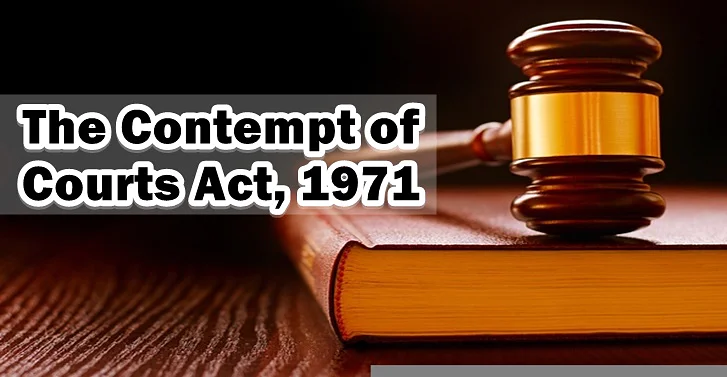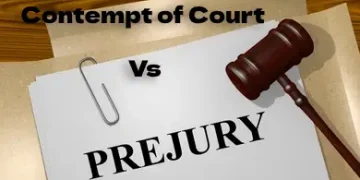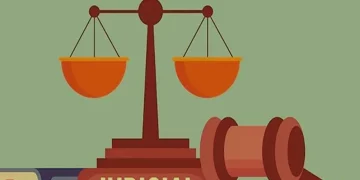Contempt of Court or Contempt has been defined as any conduct which tends to disrespect or overlook the authority of Law and Order. The expression contempt of court has not been defined by the Constitution. Although:
Article 129:
Grants Supreme Court the power to punish for contempt of itself.
Article 142(2):
Enables the Supreme Court to investigate and punish any person for its contempt.
Article 215:
Grants every High Court the power to punish for contempt of itself.
The law regarding contempt has been made for preserving the dignity of the courts and keeping the administration of justice properly. According to Halsbury, Contempt consists of any words, spoken or written which obstruct the course of administration of justice.
The Contempt of Court Act, 1971, defines the power of courts to punish for their contempt and regulates their procedure. It seeks to protect judicial institutions from any kind of disobedience towards judges, or obstruction in the implementation of their directives, or comments and actions that exhibits disrespect. Such a person can be punished under section 12 of the Act.
Need for Contempt Law
To protect the judiciary from unfair attacks and to thwart an unexpected fall in the judiciary�s status in the eyes of public. Also, to uphold the majesty and dignity of the judiciary.
Contempt powers assist judges to perform their duties, for instance deciding cases without fear, biasness, affection or animosity.
Relevant Sections
Section 10: Power of High Court to punish contempt of subordinate courts:
Every High Court shall have and exercise the same jurisdiction, powers and authority, in accordance with the same procedure and practice, in respect of contempt of courts subordinate to it as it has and exercises in respect of contempt of itself.
Provided that no High Court shall take cognizance of a contempt alleged to have been committed in respect of a court subordinate to it where such contempt is an offence punishable under the Indian Penal Code (45 of 1860).
Section 11:
Power of High Court to try offences committed or offenders found outside jurisdiction.
A High Court shall have jurisdiction to inquire into or try a contempt of itself or of any court subordinate to it, whether the contempt is alleged to have been committed within or outside the local limits of its jurisdiction, and whether the person alleged to be guilty of contempt is within or outside such limits.
Section 12: Punishment for contempt of court
Notwithstanding anything contained in any law for the time being in force, no court shall impose a sentence in excess of that specified in sub-section (1) for any contempt either in respect of itself or of a court subordinate to it.
Section 15: Cognizance of criminal contempt in other cases.
In the case of any criminal contempt of a subordinate court, the High Court may take action on a reference made to it by the subordinate court on a motion made by the Advocate-General or, in relation to a Union territory, by such Law Officer as the Central Government may, by notification in the Official Gazette, specify in this behalf.
Relevant Case Laws:
In Delhi Judicial Service Association vs. State of Gujarat,[1]
Relevant para nos.: Para 19, 21, 26 to 31, 37 and 38.
The above mentioned case is a Landmark Judgment where the Supreme Court ruled out that it has the power to punish for contempt not only of itself but also of high courts, subordinate courts and tribunals functioning in the entire country and is not against the constitution of India. Both the Supreme Court as well as High Courts are courts of record. The Constitution does not define Court of Record, but this expression is well recognized in juridical world. A Court of record is a court whereof the acts and judicial proceedings are enrolled for a perpetual memorial and testimony, and has power of summarily punishing contempt of itself as well as of subordinate courts.
The High Court being a court of record has inherent power in respect of contempt of itself as well as of its subordinate courts even in the absence of any express provision in any Act. The Supreme Court being the Apex court and a superior court of record has the power to determine its jurisdiction under Article 129 and jurisdiction to initiate or entertain proceedings for contempt of the subordinate courts. This view does not run counter to any provision of the Constitution.
In E Bapanaiah vs. K.S. Raju & others,[2]
Relevant para nos.: Para 25 to 27.
Powers of the High Courts to punish for contempt including the powers to punish for contempt of itself flow from Article 215 of the Constitution of India. Section 10 of the Contempt of Courts Act, 1971 empowers the High Courts to punish contempt of its subordinate courts. The Company Law Board is judicially subordinate to the High Court and, even if it�s administrative control is held not to vest in the High Court under Section 10 of the 1971 Act.
In Dayal Singh & others vs. State of Uttaranchal,[3]
Relevant para nos.: Para 42 and 47.2.
The Supreme Court in this case held, as there was no action taken by the superior authority of the concerned departments. This court hold them guilty under Contempt of Court Act, 1971.
In P.D. vs. UW [4]
Relevant para nos.: Para 29.
In view of the fact that the petitioner has succeeded in demonstrating, prima facie, that the respondent has committed contempt of the order, passed by the Family Court, Dwarka. Therefore he is called upon to show cause as to why he should not be punished under Section 10 read with 2(b) of the Contempt of Courts Act, 1971.
In Pamela Manmohan Singh vs. Harnam Kaur & Others, [5]
Relevant para nos.: Para 11 and 12.
The respondents 2 and 3 have violated the orders passed by the subordinate court. The question that now arises is how the said respondents to be dealt with. Insofar as the punishment under Section 12 of the Contempt of Courts Act, 1971 is concerned; Contempt of court may be punished with simple imprisonment for a term which may extend to six months, or with fine which may extend to two thousand rupees, or with both. In the facts and circumstances of the current case, a fine of Rs 2,000/- was imposed on each of the contemnors.
In Santosh Kapoor vs. Apex Computers P. Ltd. [6]
Relevant para nos.: Para 3, 26 and 27.
From the aforementioned facts, I am of the view that right from the inception the Respondent had no intention of paying any amount and he agreed for a settlement and gave post-dated cheques as well as repeated undertakings, including the last one, only with the intent of gaining time and delaying the execution proceedings. The respondent intentionally and deliberately adopted such a course of action, despite having other options. Consequently, 1 am of the opinion that it is a clear case of wilful breach of an undertaking given to the Executing Court and the petitioner is guilty of contempt of court.
In Vir Bhan vs. MCD, [7]
Relevant page nos: [Pg. 266-C & D].
In the present case not only was the petition admitted but permission was given to file additional affidavits and counter affidavits, and even oral evidence was taken before a learned Judge of this court. After all the time taken and leading evidence it seems to me inappropriate to refuse at this stage to entertain this petition and drive the parties to another round of tortuous litigation involving considerable expense and time. And the court further held the person to be guilty of contempt of court.
Conclusion
Thus, under Article 129 and 142(2) of the Constitution of India, The Supreme Court ruled out that it has the power to punish for contempt not only of itself but also of high courts, subordinate courts and tribunals functioning in the entire country and is not against any provisions or Acts. Therefore, The Supreme Court being the Apex court has the jurisdiction to initiate or entertain proceedings for contempt of the subordinate courts as well.
Under Article 215 of the Constitution of India, High Court being a court of record has inherent power in respect of contempt of itself as well as of its subordinate courts even in the absence of any express provision in any Act. Also Section 10 of the Contempt of Courts Act, 1971 empowers the High Courts to punish contempt of its subordinate courts.
It should be noted here that The power of the High Courts to punish for contempt of a subordinate court is derived from legislation and not from the Constitution.[8]
End-Notes:
(1991) 4 SCC 406.
(2015) 1 SCC 451.
(2012) 8 SCC 263.
2019 SCC OnLine Del 8908.
2008 SCC OnLine Del 643.
2009 SCC OnLine Del 129.
1974 SCC OnLine Del 179.
Durga Das Basu, Commentary on the Constitution of India 5628 (LexisNexis Butterworths Wadhwa, Nagpur, Vol. 5, 8th Edition).

















